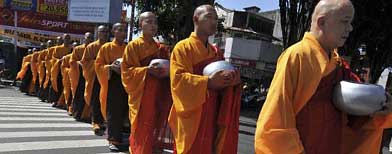Petaling Jaya (The Star/ANN) - Fourteen victims who fell for a 4-D scam operated by a syndicate posing as a popular Thai monk have lost more than 1.6mil ringgit (US$526,700) in Malaysia.
Malaysian Chinese Association (MCA) public services and complaints department head Michael Chong said the syndicate mainly targeted Chinese but ran out of luck recently due to constant publicity in Chinese dailies.
"The syndicate is now targeting the Malay segment and we have recently received a complaint from a Malay victim who lost 30,000 ringgit to it," he said at a press conference.
He said the syndicate usually employed odd-job workers to place flyers advertising the monk's contact number on cars and in mail boxes belonging to Malay owners.
The flyers also featured a so-called testimonial by a person whose "life was changed due to the help of the monk".
Chong said the victims would call the number on the flyer to ask for lucky numbers for lottery betting.
"For a higher winning chance and prize, more money has to be paid to the bogus monk," Chong said.
The victims said the bogus monk informed them that the money would be paid to the "super monks" for their prayers and predictions of lucky numbers.
"These victims usually realise they have been cheated when the predicted lucky numbers they have paid for did not win," Chong said.
He added that in February this year, a 40-year-old woman lost more than 1mil ringgit to the syndicate in hopes of increasing her winning chances in lottery betting.
He also mentioned that none of victims had met or seen the bogus monk personally, and the money was paid via telegraphic transfer.
Malaysian Chinese Association (MCA) public services and complaints department head Michael Chong said the syndicate mainly targeted Chinese but ran out of luck recently due to constant publicity in Chinese dailies.
"The syndicate is now targeting the Malay segment and we have recently received a complaint from a Malay victim who lost 30,000 ringgit to it," he said at a press conference.
He said the syndicate usually employed odd-job workers to place flyers advertising the monk's contact number on cars and in mail boxes belonging to Malay owners.
The flyers also featured a so-called testimonial by a person whose "life was changed due to the help of the monk".
Chong said the victims would call the number on the flyer to ask for lucky numbers for lottery betting.
"For a higher winning chance and prize, more money has to be paid to the bogus monk," Chong said.
The victims said the bogus monk informed them that the money would be paid to the "super monks" for their prayers and predictions of lucky numbers.
"These victims usually realise they have been cheated when the predicted lucky numbers they have paid for did not win," Chong said.
He added that in February this year, a 40-year-old woman lost more than 1mil ringgit to the syndicate in hopes of increasing her winning chances in lottery betting.
He also mentioned that none of victims had met or seen the bogus monk personally, and the money was paid via telegraphic transfer.




No comments:
Post a Comment